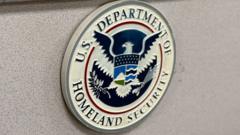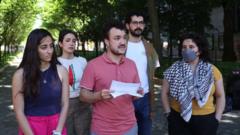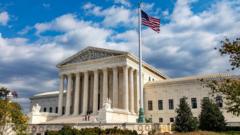A recent ruling permits the Trump administration to proceed with the deportation of Columbia University graduate Mahmoud Khalil, provoking discussions on free speech, immigration laws, and the implications of political activism in the US.
US Judge Approves Deportation of Columbia Graduate Mahmoud Khalil Amid Controversy

US Judge Approves Deportation of Columbia Graduate Mahmoud Khalil Amid Controversy
Mahmoud Khalil, a pro-Palestinian activist and legal permanent resident, faces deportation after a US judge backs the Trump administration's claims of foreign policy risks.
A US immigration judge has granted the Trump administration permission to deport Mahmoud Khalil, a Columbia University graduate, following his involvement in pro-Palestinian protests. Khalil, who has been a vocal advocate for Palestinian rights, was detained last month as US immigration officers acted on claims that his presence in the United States posed risks to American foreign policy, citing a Cold War-era immigration law.
Despite being a permanent legal resident and not facing any criminal charges, Khalil's arrest has raised significant alarm regarding the broader implications for free speech and political dissent in America. In a written communication from the detention facility, he stated that his "arrest was a direct consequence" of his activism, leading observers to question the allocation of legal protections for those speaking against US foreign policy.
The latest immigration court ruling, though supportive of the government’s argument, does not necessitate Khalil’s immediate removal. His legal representation has until April 23 to appeal the order. The rulings not only indicate a response to Khalil’s individual case but have also sparked a wider debate about the intersection of immigration policy and political expression, especially in the context of protests against the ongoing conflict in Gaza.
The current administration's application of a 1952 law raises concerns among civil rights groups, including the American Civil Liberties Union (ACLU), which characterized the ruling as motivated by pre-existing determinations rather than concrete evidence. Downgrading criticisms of Khalil’s protests as irrelevant to American law, ACLU maintained that he was targeted for exercising his civil liberties.
The case has garnered support from various groups who argue that the deportation would set a dangerous precedent for activists across the country. Khalil's legal team reiterated that the government has failed to provide substantial evidence of any antisemitism linked to his actions. In addition, allegations of immigration fraud, based on his work experiences that were listed in his green card application, remain unproven as no new evidence has been presented by the administration.
As the case develops, Khalil has filed a federal lawsuit challenging his arrest's constitutionality, with his attorneys asserting that a successful outcome could potentially hinder deportation efforts. The legal action reflects a broader commitment to fight for the right to speak openly against US policies, an essential component of democracy that many believe is being undermined in this instance.
The department of Homeland Security’s Secretary Kristi Noem expressed approval for the judge’s decision, purporting to protect American values against those who allegedly promote harm. As the legal battle unfolds, stakeholders on all sides of the debate are left to navigate the complex web of free expression, immigration policy, and international relations.























